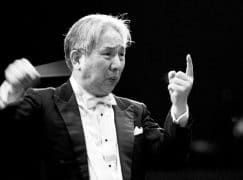The first Chinese to conduct in the US
mainHan Zhongjie has died in Biejing, aged 97.
He once said: ‘How I wish I could have pursued my music career in an environment that was free of political interference.’
In 1980 he conducted the Boston Symphony Orchestra, one of many thaws that followed Seiji Ozawa’s 1978 China tour.
Han went on to tour the Central Philharmonic in various countries and to teach two generations of Chinese conductors.
Full life story here.






I was slightly curious to read Han’s biography, I visited Beijing several times in 1985 and 1986 when the Central Philharmonic’s Music Director was definitely Li Delun. Li was known to the west from his conducting with Isaac Stern in the documentary “From Mao to Mozart”.
I had the great pleasure of meeting Li on several occasions, an outgoing bear of a man who loved music and his orchestra, I recall his describing with tears in his eyes the building where they had to rehearse during the Cultural Revolution as “a pigsty” and the four Chinese works they were only allowed to perform during those ghastly years as dictated by Mao’s wife, Jiang Qing.
The article seems to imply that Han was the Central Philharmonic MD around this time. In fact, as Sheila Melvin and Jindong Cai make clear in their excellent book on the development of classical music in China “Rhapsody in Red”, Han only conducted at in the late 1970s because Li had been purged and sent to the south. So it was Han who met Ozawa when it really should have been Li. And it was that meeting which resulted in the invitation for Han to conduct in Boston.
Li was finally brought back to Beijing after the protests of his friends and colleagues in the Central Philharmonic reached the ears of Hu Yaobang, a future General Secretary of the Party, who persuaded the Ministry of Culture to recall him. He returned from his enforced two year exile in time to lead his orchestra during the “Mao to Mozart” documentary later in 1979.
It is perhaps interesting to note that in “Rhapsody in Red”, there are just two references on two pages to Han. On the other hand, there are 36 to Li covering a total of 67 pages. I don’t wish to detract from Han’s accomplishments in what inevitably were exceedingly difficult times, only to point out that Li was a much greater figure in the development of music in China and almost certainly a finer conductor.